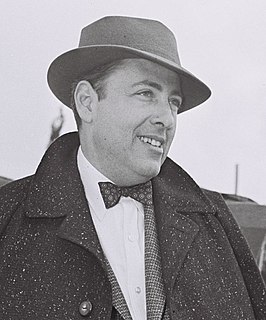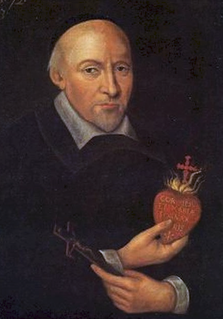A Quote by Robert Louis Stevenson
His friends were those of his own blood or those whom he had known the longest; his affections, like ivy, were the growth of time, they implied no aptness in the object.
Related Quotes
There were times when it appeared to Dorian Gray that the whole of history was merely the record of his own life, not as he had lived it in act and circumstand, but as his imagination had created it for him, as it had been in his brain and in his passions. He felt that he had known them all, those strange terrible figures that had passed across the stage of the world and made sin so marvellous, and evil so full of subtlety. It seemed to him that in some mysterious way their lives had been his own.
His face set in grim determination, Richard slogged ahead, his fingers reaching up to touch the tooth under his shirt. Loneliness, deeper than he had never known, sagged his shoulders. All his friends were lost to him. He knew now that his life was not his own. It belonged to his duty, to his task. He was the Seeker. Nothing more. Nothing less. Not his own man, but a pawn to be used by others. A tool, same as his sword, to help others, that they might have the life he had only glimpsed for a twinkling. He was no different from the dark things in the boundary. A bringer of death.
We say, then, that Scripture clearly proves this much, that God by his eternal and immutable counsel determined once for all those whom it was his pleasure one day to admit to salvation, and those whom, on the other hand, it was his pleasure to doom to destruction. We maintain that this counsel, as regards the elect, is founded on his free mercy, without any respect to human worth, while those whom he dooms to destruction are excluded from access to life by a just and blameless, but at the same time incomprehensible judgment
David knew that the very quality of his worship was not based on his own volition but on the object of his worship - the Father, Son and Holy Spirit. Though our affections for God may wax and wane, His character is unchanging! We even see David speaking to his own soul, demanding of it, "Bless the Lord!"
Such was the will of the Father that his Son, blessed and glorious, whom he gave to us, and who was born for us, should by his own blood, sacrifice, and oblation, offer himself on the altar of the cross, not for himself, by whom "all things were made," but for our sins, leaving us an example that we should follow his steps.
The sinners to whom Jesus directed His messianic ministry were not those who skipped morning devotions or Sunday church. His ministry was to those whom society considered real sinners. They had done nothing to merit salvation. Yet they opened themselves to the gift that was offered them. On the other hand, the self-righteous placed their trust in the works of the Law and closed their hearts to the message of grace.
By the time Kafka was seven or eight years old, he already had a relatively dark view of the world derived from experiences in his own family. This told him that the world was organized in a strictly hierarchical manner and that those on the top were allowed to mete out punishment in any way they chose. They were entitled to leave those on the bottom uninformed about the rules to which they subscribed; they weren't even required to follow their own rules - this is how Kafka described it in his later Letter to My Father.
Hitler appeared, a man with limited intellectual abilities and unfit for any useful work, bursting with envy and bitterness against all whom circumstance and nature had favored over him....In his desperate ambition for power he discovered that his speeches, confused and pervaded with hate as they were, received wild acclaim by those whose situation and orientation resembled his own. He picked up this human flotsam on the streets and in the taverns and organized them around himself. This is the way he launched his political career.
Every man should write a brief history of his life: his parentage, his birth, his religion, when he was baptized and by whom, when ordained, what to, and by whom-give a brief sketch of all his missions and of all his official acts and the dealings of God with him. Then if he were to die and the historians wished to publish his history, they would have something to go by.
Let us fill a cup and drink to that most noble, ridiculous, laughable, sublime figure in our lives... The Young Man Who Was. Let us drink to his dreams, for they were rainbow-colored; to his appetites, for they were strong; to his blunders, for they were huge; to his pains for they were sharp; to his time for it was brief; and to his end, for it was to become one of us.
They were not friends. They didn't know each other. It struck Tom like a horrible truth, true for all time, true for the people he had known in the past and for those he would know in the future: each had stood and would stand before him, and he would know time and time again that he would never know them, and the worst was that there would always be the illusion, for a time, that he did know them, and that he and they were completely in harmony and alike. For an instant the wordless shock of his realization seemed more than he could bear.







































